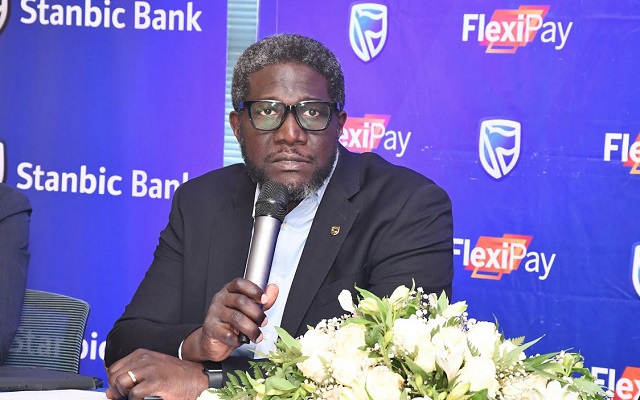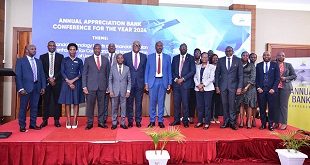
Average cost of sending money back home for Uganda’s migrant workers is 11.3%, higher than global average
Kampala, Uganda | RONALD MUSOKE | Uganda’s largest lender, Stanbic Bank Uganda, has entered into a new partnership with the UN’s International Fund for Agricultural Development (IFAD) to assist Ugandan migrant workers abroad in sending home money using its digital payments platform, Flexipay.
The partnership will provide remittance recipients, especially in rural areas, with digital and financial training to promote a savings culture and foster digital finance uptake among these communities.
IFAD’s new partnership with Stanbic Bank will also see Ugandans abroad incur a transaction fee that is within the Sustainable Development Goal (SDG) target of 3% (SDG 10) when sending money to the recipient’s Flexipay wallet.
Flexipay is a financial product under the European Union-funded Platform for Remittances, Investments and Migrants’ Entrepreneurship in Africa (PRIME Africa). Besides Uganda, this initiative is also fostering local economic opportunities in Ghana, Kenya, Morocco, Senegal, South Africa and Gambia.
IFAD and Stanbic Bank will work together to integrate remittance service providers and payment hubs into Stanbic Bank’s FlexiPay, enabling the unbanked rural Ugandan population to access financial services.
Initially, two of the most relevant remittance corridors will be targeted; migrant Ugandan workers based in Kenya and Sweden wishing to send money to Uganda. The initiative addresses development opportunities through innovation, partnerships, and scalable products that promote cheaper, faster, and safer remittance transfers, maximizing the impact of remittances for millions of families.
“We are delighted to extend affordable international remittances in partnership with IFAD through Flexipay and reach rural remittance recipients,” Sam Mwogeza, Stanbic Bank Uganda’s Executive Head for Personal and Private Banking (PPB).
“FlexiPay has a simplified onboarding process that facilitates un(der)banked clients’ uptake. The wallet allows its users to store and transfer money, pay bills, top-up airtime and transact through a feature phone as well as a smartphone.”
Currently, the average cost of sending money back home for Uganda’s migrant workers is 11.3%, higher than the global average of 6.25% and continental average of 8.35%.
Remittances key in fight against poverty
This development comes at a time when available data indicates more than three-quarters of remittances to Uganda is used to fight poverty and improve access to nutrition, health, housing, and education while the remaining portion is used to support entrepreneurial activities and facilitate access to financial products such as savings and credit, leading to financial inclusion.
“Thanks to IFAD’s financial support, Stanbic Bank Uganda is now able to overcome market barriers and play a crucial role in meeting the needs of remittance families through its Flexipay e-wallet,”said Mohamed El-Ghazaly, IFAD representative and Country Director in Uganda.
“This digital financial service offers a safe, fast, and easy way for families to make electronic payments, which is a popular alternative to traditional bank transfers. The European Union is delighted to support this initiative because it is going to help migrants in the EU and their families and friends at home to make the most of their remittances by saving in transactional fees due to lower costs for sending money.”
“Our support is geared towards promoting digitalization and financial inclusion for the benefit of millions of people at home and abroad,” added Jan Sadek, the Head of the European Union Delegation in Uganda.”
Financial literacy in rural Uganda
In addition to developing FlexiPay’s capability to support remittances, IFAD’s partnership will also support the Stanbic Business Incubator, a sister company of Stanbic Bank.
The company will design and implement digital and financial literacy training for Savings and Credit Cooperative Societies (SACCOs), aimed at empowering and fostering rural people to adopt the Flexipay wallet as a solution to receive remittances.
This is premised on the fact that the uptake of digital methods for sending and receiving money is still hindered by the lack of financial and digital literacy, lack of trust in digital payment methods, a limited number of access points in rural areas, and the high percentage of informal remittances coming from the neighbouring countries.
Uganda is ranked among the 10 sub-Saharan Africa remittance recipient countries, with most of its inflows coming from Europe, the Middle East, and the USA.
Last year, international remittance inflows into the country reached US$1.2 billion, close to the pre-Covid values of US$ 1.4 in 2019. These inflows have for the past decade represented around 3% of the country’s yearly gross domestic product (GDP).
 The Independent Uganda: You get the Truth we Pay the Price
The Independent Uganda: You get the Truth we Pay the Price


